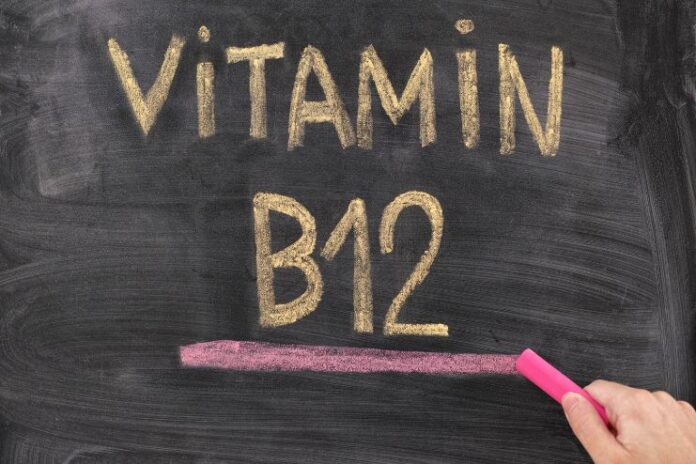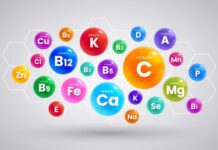Affiliate Disclaimer
Some links in this article are affiliate links. We may earn a small commission if you make a purchase through these links, at no extra cost to you. We only recommend products we find useful to our readersDid you know that about 40% of adults may lack vitamin B12, a mineral vital for brain function? This water-soluble vitamin is essential for DNA synthesis, red blood cell creation, and neuron function. Fatigue, memory problems, and even nerve damage result from the body’s inability to produce enough energy when B12 levels are low.
A vitamin B12 deficit is more likely to occur in vegetarians, vegans, older people, and people with digestive issues. Ensuring you’re getting enough can help your heart, brain, and energy levels.
Even though B12 is essential for general health, taking too many supplements can have minor negative effects, including lightheadedness, acne, or digestive problems. Being aware of the advantages and disadvantages of vitamin B12 can facilitate making educated decisions regarding your health. Let’s examine all the information you require regarding this vital nutrient.
Read More: Relationship Between Vitamin Deficiency and Diabetes
What is Vitamin B12?
Vitamin B12, also known as cobalamin because it contains the element cobalt, is an essential nutrient with several benefits for the body. It plays a key role in producing red blood cells and DNA. Additionally, it is crucial for the development and function of the brain and spinal cord, which make up the central nervous system. Vitamin B12 also supports healthy skin, hair, and nails.
Since the body cannot produce Vitamin B12 on its own, it must be obtained from dietary sources. It is naturally found in animal-based foods such as beef, chicken, fish, and dairy products. Some manufacturers also fortify foods like breakfast cereals with B12, and it is also available as an oral supplement. In cases of deficiency, doctors may prescribe Vitamin B12 injections or nasal sprays.
As a water-soluble vitamin, excess B12 is eliminated through urine. However, the liver can store it for up to five years. If dietary intake is insufficient over time, a deficiency may develop. Older adults and individuals with digestive disorders, such as Crohn’s disease or celiac disease, are particularly at risk of Vitamin B12 deficiency due to impaired nutrient absorption.
An untreated Vitamin B12 deficiency can lead to anemia, fatigue, muscle weakness, digestive problems, nerve damage, and mood disturbances. Ensuring an adequate intake of this vital nutrient is essential for overall health and well-being.
Signs and Symptoms of Vitamin B12 Deficiency
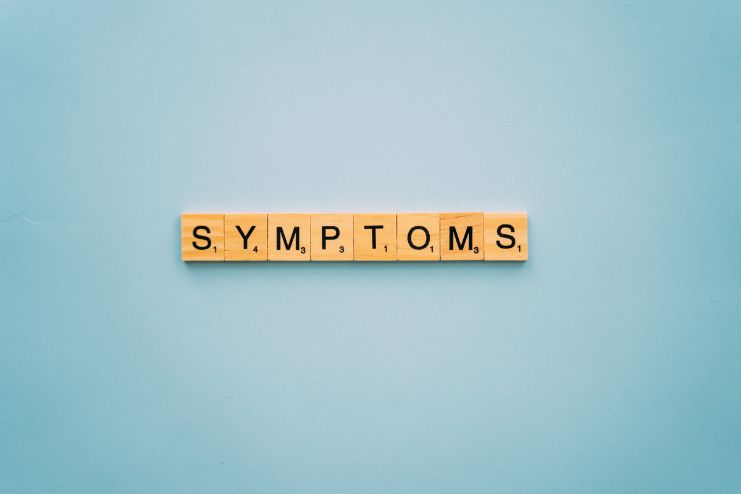
A lack of vitamin B12 can result in neurological, psychological, and physical consequences. Vitamin B12 insufficiency symptoms can appear gradually and worsen with time. Despite having low levels of vitamin B12 in their systems, some people may not experience any symptoms at all.
A vitamin B12 shortage might cause the following general physical symptoms:
- Extreme fatigue or weakness.
- Feeling queasy, throwing up, or having diarrhea.
- Not as hungry as usual.
- Experiencing tongue or mouth pain.
Among the neurological signs of a vitamin B12 shortage are:
- Tingling or numbness in your feet and hands.
- Difficulties with seeing.
- Having trouble speaking or walking as you usually do.
The following are some psychological signs of vitamin B12 deficiency:
- Experiencing depression.
- Being agitated.
- Noticing a shift in your emotions and actions.
Read More: Top 3 At-Home Vitamin Deficiency Tests for Better Wellness
How to Add More Vitamin B12 to Your Diet Food
Increasing your intake of vitamin B12 is simple with the correct meal choices. Dairy products, poultry, eggs, and fish (tuna, salmon) are among the finest natural sources. Fortified meals like plant-based milk, cereals, and nutritional yeast are great substitutes for vegetarians and vegans.
If dietary sources of vitamin B12 are inadequate, those at risk of insufficiency may benefit from B12 injections or supplements to maintain appropriate levels. By including a range of foods high in vitamin B12 in your meals, you can prevent anemia, promote brain function, and maintain consistent energy levels. Put a healthy diet first for your general health!
Benefits of Vitamin B12 for Skin and Hair
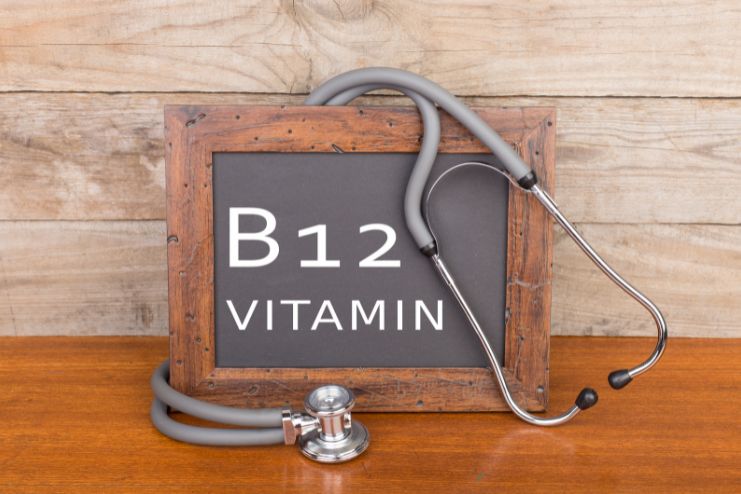
Vitamin B12 plays a significant role in cell production, making it necessary for healthy nails, hair, and skin. Consumption of vitamin B12 also helps reduce dryness, redness, inflammation, and acne blemishes, thus reducing the risk of eczema and psoriasis. It also reduces hair loss and strengthens nails.
1. Promotes Cell Regeneration
Your body continuously removes dead skin cells to create new ones, much like your favorite detoxifying face mask. Facilitating the synthesis of ATP, cellular energy that is utilized to create new skin cells, is one of vitamin B12’s primary roles in the human body.
B12 catabolizes amino acids to produce ATP and aids in the oxidation of fatty acid for use as an energy source.
2. Production of Red Blood Cells and the Distribution of Oxygen
First, vitamin B12 aids in the body’s production of the necessary red blood cells. Additionally, the vital vitamin guarantees that these cells are the right size and form to carry oxygen throughout the body.
The body uses healthy red blood cells to transport oxygen to all body parts, including hair follicles. This oxygen is necessary for hair follicles to promote hair growth.
3. Avoids Excessive Pigmentation
Although it is more common in older populations, hyperpigmentation can affect the people of any age or race.
Hyperpigmentation occurs when the skin accumulates too much melanin, a natural pigment that darkens skin, in one small area instead of distributing it uniformly. Common names for hyperpigmented regions include sunspots, liver spots, and age spots.
Vitamin B12 can reverse prematurely greying hair and prevent and treat skin and nail hyperpigmentation.
Read More: 8 Most Effective Prenatal Vitamins for Hair Growth
4. Aids in the Feeling of Nourished Dry, Flaky Skin
You’ve probably had dry or flaky skin at some point, regardless of your skin type, mainly if you live in a cold, dry region. However, vitamin B12 helps stop and treat these bothersome—and occasionally painful—skin conditions.
B12 promotes skin healing and dead cell shedding through its ability to regenerate cells and carry oxygen to circulation. Although oral B12 supplements are a great way to address a deficiency and help maintain long-term healthy B12 levels, many topical skin care products, such as lotions, creams, and serums, contain extra B12 to aid skin healing.
5. Enhances Energy
B12 helps cells produce energy and significantly affects people’s overall energy levels.
You can avoid exhaustion, low metabolism, diminished cognitive function, and dyspnea by maintaining a healthy circulatory and cell regeneration system, which will increase your energy levels overall. The opposite is true—all these symptoms can result from B12 deficits.
Read More: 6 Best Vitamins To Improve Your Brain Health
Side Effects of Vitamin B12
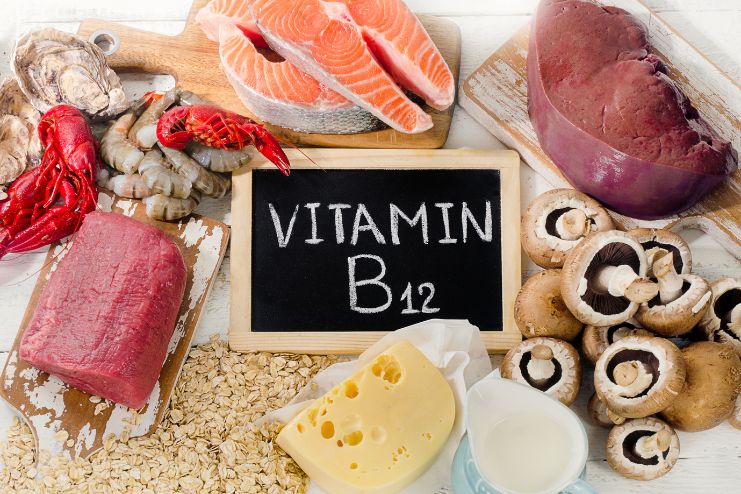
Regardless of how you are taking your vitamin B12 dosage, you may experience some of the widespread side effects.
1. Rashes on the Skin
Skin rashes are among the most frequent adverse effects of vitamin B12 excess. You may experience welts all over your body, which could cause your skin to flush. Additionally, you may experience itching throughout your body. The severity of your body’s vitamin B12 overload determines how severe these skin rashes may get on your skin.
2. Lack of Sleep
Insomnia is the inability to get a good night’s sleep. An excess of vitamin B12 may cause insomnia or exacerbate an existing condition by interfering with your regular sleep cycle. It typically occurs due to vitamin B12 raising your energy levels, which disrupts regular sleep cycles and eventually results in insomnia.
3. Changes in Mood
A vitamin B12 overload may also have an impact on your mental health. It may result in mental health problems such as sadness, anxiety, mood changes, and restlessness. Those who commonly experience confusion, paranoia, or mental fogginess may experience a worsening of the effects of vitamin B12 on mental health.
Read More: The Interplay of Vitamin D Deficiency and Diabetes Risk
Conclusion
Consider vitamin B12 your body’s ignition key; without it, your energy levels drop, you start to feel disoriented, and your nerves begin to malfunction. This essential nutrient is necessary for heart health, brain function, and red blood cell synthesis; it cannot be compromised for general well-being.
The majority of people can obtain enough from the diet. Still, other populations—vegans, vegetarians, the elderly, pregnant women, and persons with digestive disorders—may find it difficult to maintain sufficient amounts. B12 pills can be a lifesaver for them, preventing deficits that cause mood swings, exhaustion, and even harm to the nerves.
But more isn’t always preferable. Although toxicity is uncommon, excessive supplementation may result in moderate side effects, including acne or lightheadedness. The key? Balance. Prioritize meals high in B12 and only take supplements if necessary. Pay attention to your body’s signals and make wise decisions because it thrives on nutritional balance. Use fuel wisely and lead a lively life!
-
July 2017Written by Prajakt
-
March 2025Edited by Ankita
References
- https://www.mayoclinic.org/drugs-supplements-vitamin-b12/art-20363663
- https://www.webmd.com/diet/vitamin-b12-deficiency-symptoms-causes
- https://www.mountsinai.org/health-library/nutrition/vitamin-b12
- https://nutritionsource.hsph.harvard.edu/vitamin-b12/
- https://my.clevelandclinic.org/health/diseases/22831-vitamin-b12-deficiency
- https://www.medicalnewstoday.com/articles/324265
- https://www.healthline.com/health/food-nutrition/vitamin-b12-side-effects#side-effects
- https://www.webmd.com/vitamins/ai/ingredientmono-926/vitamin-b12
- https://redcliffelabs.com/myhealth/food-and-nutrition/some-side-effects-of-vitamin-b12-if-taken-excessively/
In this Article













